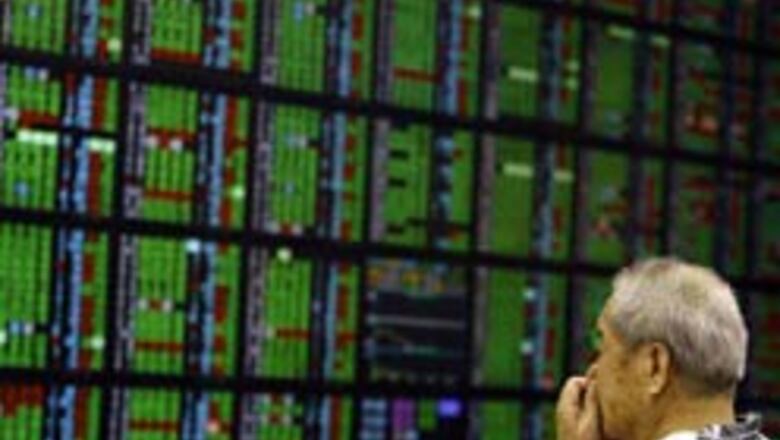
views
Hong Kong: Asian shares rounded out their worst year ever on Wednesday, down 50 percent after 12 months of financial market and economic turmoil, but optimism that 2009 will be an improvement lifted stocks for a third straight session.
Government bond yields held near their lowest in decades, oil prices dipped further below $40 a barrel and the U.S. dollar extended its recent falls as it heads into 2009 in a position of weakness due to the near-zero interest rates in the world's largest economy.
Yet some remain optimistic after a year of shattered milestones, as policy makers worldwide respond to the worst financial crisis in decades with antidotes that combine slashing interest rates, rescuing whole sectors and boosting spending.
"It has been a shocking year, hardly anything was spared in the market carnage," said Michael Heffernan, senior client adviser and strategist at Austock Group in Australia. Turning to 2009, however, he saw hope. "The blood has been drained and we are now getting a transfusion," he added.
The MSCI index of Asia-Pacific stocks outside Japan rose 0.9 percent as of 0615 GMT. On a yearly basis it was ugly. The MSCI index dropped a little more than 50 percent in its worst performance on record after US mortgage and real estate markets collapsed, sparking the collapse of Lehman Brothers and threatening the global economy.
Merrill Lynch estimates nearly $2 trillion was wiped out this year from the broader MSCI Asia-Pacific.
Santa rally
Yet 2008 also ends with momentum. December marks the first monthly gain for the index since April and it has now risen over 25 percent since hitting a five-year low in late November. The gains come despite consistently bleak signals in December on the economic front, in a sign that investors may already be discounting the grim environment.
"Most of the bad news we can think of, we've already heard it this year," said Winson Fong, managing director at SG Asset Management in Hong Kong. Data on Tuesday showed U.S. consumer confidence fell to a record low in December, prices of U.S. single-family homes continued to plunge, while the U.S. holiday shopping season was the worst since at least 1970.
PAGE_BREAK
Yet Australia's main index rose 1.9 percent on Wednesday, while Hong Kong shares rose 1.1 percent and Indian shares advanced 0.5 percent. However, markets in Shanghai and Singapore fell. Shanghai posted the biggest drop among major world indexes, down some 65 percent. Markets in Japan and South Korea were already closed for the year.
Good, bad and just ugly
From inflation to deflation, or de-coupling to contagion, it was a year of unprecedented swings, not only in global markets but also in conventional wisdom.
Oil started the year setting a series of records that culminated with prices hitting a peak at little under $150 in July. It heads to the end of year below $39 a barrel, as investors have adjusted to the new economic order.
Prices will rise in 2009, but not by much. Analysts are forecasting an average of $49 a barrel for U.S. crude in the first quarter, and an average of $58.48 for the year. In between, bursts of volatility in oil prices are expected as shown by the violence between Israel and Islamic group Hamas that sent oil prices jumping as much as 12 percent on Monday.
"Basically, the situation globally is much worse than expected. It's all very pessimistic numbers," said Tetsu Emori, a fund manager at Astmax Co Ltd in Japan. Meanwhile, the US dollar ends on a weakening tone, with the safe-haven bid that only a few months ago sent the greenback rallying all but forgotten now that the Federal Reserve intends to keep US interest rates at near zero.
Japan's yen surged about 19 percent this year to post its biggest annual percentage gain since 1987, denting the prospect of exporters in the world's second-largest economy.
British sterling is pinned at near record lows amid a truly dire outlook for the U.K. economy. The euro edged up to $1.4115 in Asian trade, from $1.4072 late on New York on Tuesday, while the dollar was down almost 1 percent at 80.627 against a basket of currencies.
PAGE_BREAK
The euro was holding firm at 97.75 pence against the sterling, having touched a high of 98.05 on Tuesday, near parity for the first time since its launch in 1999. Assets seen as safer during times of trouble outperformed.
Gold was trading at $865.35 an ounce, down $6.75 from New York's notional close on Tuesday, but it still ends the year as one of few commodities to end the year firmer despite its traditional role as an inflation hedge.
Among the best bets this year were government bonds. U.S. Treasury benchmark yields have dropped this month to their lowest since 1950, amid an intense bid for safety, rock bottom rates and expected Fed buybacks of debt, including of mortgage-backed securities.
Benchmark 10-year notes dipped 4/32 in price to yield 2.067 percent on Wednesday, near the five-decade low of 2.04 percent struck earlier in the month. For the year, yields have tumbled 1.96 percentage points for their biggest yearly drop since 1995 and the second biggest in the last 20 years.


















Comments
0 comment